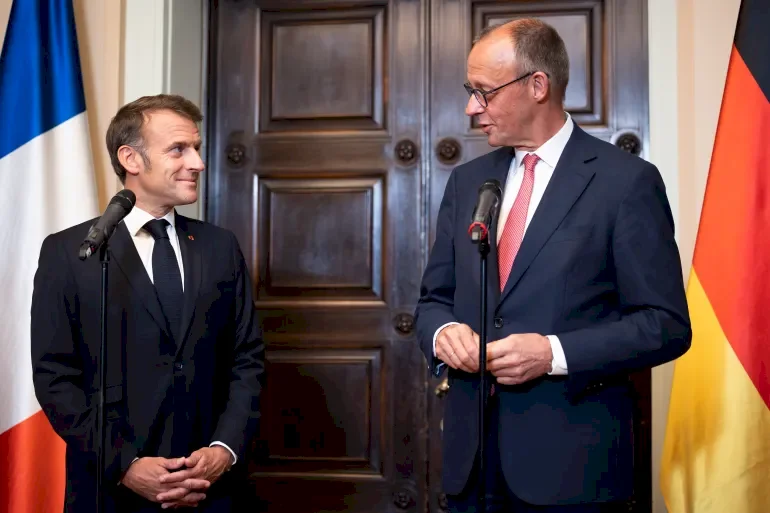
Foreign Policy: The West Turns Against Israel
SadaNews - Foreign Policy magazine reported that Germany responded to news of Israel's intention to take control of the city of Gaza by stopping the export of any military equipment that could be used there, indicating a growing shift in public opinion against the Israeli attack on the Gaza Strip.
The magazine explained - in an interview with its editor-in-chief, Ravi Agrawal, and former Israeli peace negotiator Daniel Levy - that this statement from German Chancellor Friedrich Merz comes at a time when Canada, France, and the United Kingdom indicated they would officially recognize Palestine at the annual United Nations summit next month, after three-quarters of UN member states have already recognized Palestine as a state.
It was mentioned in the magazine that even in the United States, Israel's strongest ally, the general mood is shifting, as a poll conducted by The Economist in cooperation with YouGov revealed that 84% of Americans support an immediate ceasefire, while 70% believe there is a hunger crisis in Gaza, and 45% think Israel is committing genocide.
In this context, Ravi Agrawal asked Daniel Levy, in the latest episode of "Foreign Policy Live", about the impact of these shifts on Israeli policy. Why are these changes happening now, and are they real and permanent? The peace negotiator during the tenures of Prime Ministers Yitzhak Rabin and Ehud Barak stated that the UK and France are members of the Security Council, and they are allies of Israel, believing that their actions hold a deeper meaning than what appears, as they are making gestures in response to public pressure by taking actions that do not overly damage existing bilateral relations with Israel.
Recognition Without Action
Levy clarified that the recognition of the State of Palestine by these countries is merely a symbolic gesture, predicting that they hope no further actions will be taken after the recognition, and that this would be enough to ward off public pressure, especially since they recognize a state under ongoing and illegal occupation, according to the International Court of Justice as of July 19, 2024.
However, Levy anticipated that pressure would increase after the recognition step, even though the intention is to stop down this path, pointing out that Israel will attack this and publicize it, then realize it can manage the situation as it did with the old peace process, such that countries recognizing Palestine believe they are doing serious work as evidenced by Israel's anger, and the Palestinian Authority, lacking a real strategy, will feel a brief relief, but things will soon come to a halt.
Levy added that there are maneuvers accompanying the recognition in Paris and London, where French President Emmanuel Macron is co-hosting a UN conference with the Saudis, attempting to leverage this to drive normalization of relations between Saudi Arabia and Israel, potentially achieving gains. Meanwhile, British Prime Minister Keir Starmer faces much greater pressures from within his party and electoral constituency, which may affect his political future.
Levy warned that actions likely to be avoided by these countries may be included on the agenda, such as a complete arms embargo, restrictions on other trade elements, and recalled in this context an article by Martin Sandbu in the Financial Times stating that Europe should repeat some of what happened with Russia regarding Israeli assets deposited in European banks, sports boycotts, etc., to maintain credibility.
When asked about the situation in the United States, which remains Israel's strongest and largest ally, where the administration's view does not change, but public opinion is changing, Daniel Levy noted that the clearest reason for the shift there is the policy of starvation.
Exposed Image of Gaza
The former Israeli negotiator mentioned that Gaza has been subjected to an extremely brutal blockade for nearly two decades, during which Israel calculated the calorie intake needed by Gaza's residents to maintain a subsistence level, concluding that his country has practiced collective punishment and denied access to food, energy, and water, even before and after October 2023, but this has accelerated, leading to further exposure of the images and harshness of Gaza.
The situation is exacerbated by the strange statements from Israeli leaders such as Finance Minister Bezalel Smotrich and National Security Minister Itamar Ben Gvir, and even from deep within the Likud party led by Israeli Prime Minister Benjamin Netanyahu, as they openly speak about the destruction and ethnic cleansing that they are perpetrating.
The New York Times published an article on genocide by Omar Bartov, while The Washington Post dedicated five pages to listing the children killed in Gaza. Israeli novelist David Grossman described what is happening as genocide, as did the Israeli human rights organizations B’Tselem and Physicians for Human Rights, as well as Amnesty International.
As for how it took all this time, Levy says it’s a larger story - as Israel has been extremely effective in presenting its case, and American political pressure has been effective, contrasted with the weakness of Palestinian leadership and its lack of credibility, although the Palestinians do have a very effective civil society.
Levy concluded by reminding that the International Court of Justice has put eight urgent interim measures on Israel to not violate the Genocide Convention during this period, and that the International Criminal Court has issued arrest warrants for Netanyahu and his former defense minister Yoav Galant on charges of war crimes, including starvation as a weapon of war.

Ministry of Foreign Affairs and Expatriates: We are monitoring the targeted campaign again...

American Military Review in the Arabian Sea After Muscat Talks: "Peace Through Strength"

America Accuses China of Conducting Secret Nuclear Tests

Report: Wafiq Safa, Head of Hezbollah's Coordination and liaison Unit Resigns

Report: Iran Accelerates Missile Facility Repairs Compared to Nuclear

Ending of Iran-U.S. Negotiations in Muscat and Agreement to Resume... Iraqi: Good and Limi...

What Does the Participation of a U.S. Military Leader in Iran Negotiations Mean?

